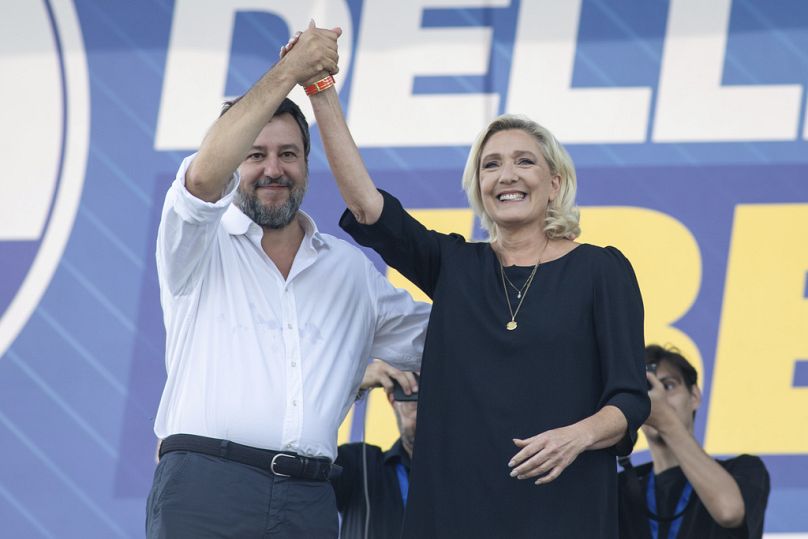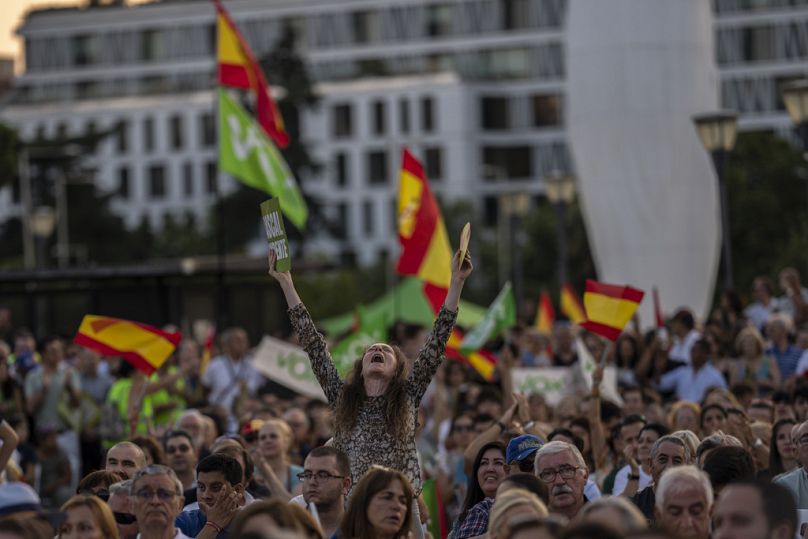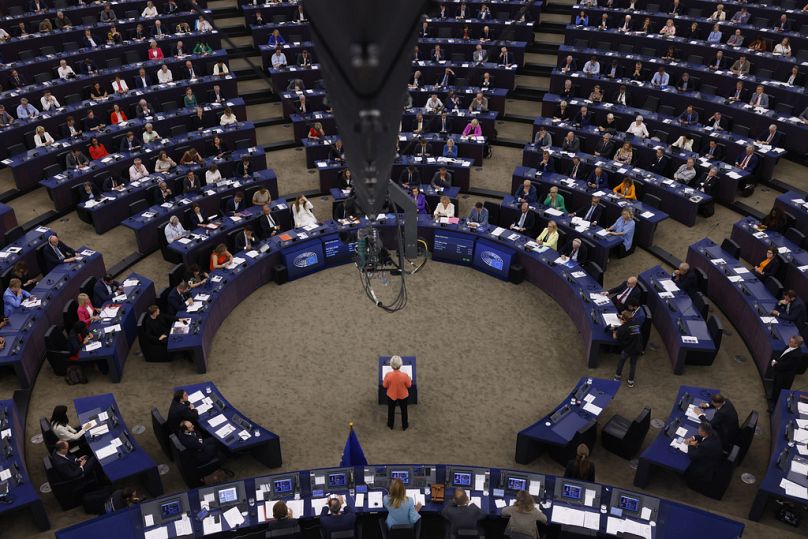The upcoming European election is a pivotal test for established political forces, notably in France and Germany, as they navigate uncharted territory for the first time since WWII, Georgios Samaras writes.
As the June European election approaches, anxiety among the continent's leaders is on the rise, and with good reason.
In Germany, the AfD consistently polls above 20%, and Marine Le Pen's National Rally in France continues to gain momentum — both a continuation of a trend seen in a number of member states.
In what appears to be a desperate last-minute appeal, Margaritis Schinas, Vice-President of the European Commission, has thrown his support behind the notion of enlisting pop star Taylor Swift to raise awareness about the upcoming election.
The endorsement comes amid warnings that the parliament may encounter serious governance challenges.
The truth is that the EU is facing a complicated election. The surge in support for far-right parties is often attributed to concerns about migration, with cultural wars now firmly entrenched in mainstream discourse.
Dua Lipa and Stromae to the rescue?
Voters also seem to prioritise the security promises offered by various far-right parties across Europe, with a common playbook emphasising welfare chauvinism and stringent measures against asylum seekers connecting most of these parties.
However, it is crucial to recognise that traditional forces in Europe, particularly mainstream European parties, largely on the centre-right, have flirted with some of these ideological elements for years. This ongoing normalisation of far-right discourse has resulted in a blurring of lines between right-leaning entities.
The question arises: is there an effective way to address the consequences of this normalisation and mitigate the rising far-right threat before the election?
While Brussels is said to be considering mobilising other, European superstars including Rosalía, Måneskin, Dua Lipa, and Stromae to help get the voters to the polls this year, the issue seems much bigger than something easily solved by popular appeal.
Taylor Swift probably cannot provide solutions, and as the window before the election is closing, it is imperative for the European centre-right to urgently undertake the challenging process of rediscovering its identity.
The dangers of overlooking the rhetoric associated with far-right ideologies must be acknowledged, and strategic measures must be taken to counteract the trend in the long run.
A shift in focus
Examples abound of how centre-right political parties have strategically tailored their policy agendas to align with far-right ideologies.
A notable case in point is the controversial immigration bill passed in December in France, which serves as a glaring manifestation of this phenomenon.
In the face of internal party divisions and impassioned reactions, President Emmanuel Macron found himself ensnared in an ideological crisis upon proposing stringent migration measures.
The bill, notably, introduces alterations to the eligibility criteria for certain social security benefits for foreigners. Le Pen considers the bill a triumph for her ideological stance.
Upon securing re-election for a second term in 2022, Macron openly acknowledged that the support he garnered from voters was not necessarily an endorsement of his own ideas but rather a strategic move to counter the rise of the far right.
This acknowledgement highlights a notable contradiction in his political stance, underscoring an ideological vagueness that is further accentuated by his significantly unfavourable popularity.
Centre-right keeps drifting away from its roots
In the summer of 2023, Friedrich Merz, leader of Germany's CDU, briefly flirted with the idea of collaborating with the far-right AfD, particularly at the local government level.
This departure from tradition raises concerns about the CDU's weakening resolve, marking a significant development in conservative politics post World War II.
A similar trend has emerged in Spain, where the conservative People’s Party came close to forming a coalition government with the far-right Vox.
Vox, known for its anti-LGBTQ+ agenda and strong climate denialism, deterred voters, ultimately leading to an unexpected victory for the left and PM Pedro Sanchez.
Meanwhile, Greece’s centre-right New Democracy is undergoing a notable shift away from its traditional centre-right roots. A wiretapping scandal has tarnished Prime Minister Kyriakos Mitsotakis' first tenure, and the government faces accusations of executing pushbacks at the borders.
More recently, the party is grappling with serious resistance within its ranks, as its ultraconservative faction refuses to support the legalisation of same-sex marriage, further underscoring the party's openness to the far right.
An Ungovernable Union?
Despite the rightward shift observed domestically in many traditional centre-right parties, the European People’s Party (EPP) stands out for its commitment to its ideology.
Notably, the EPP has rejected engaging in negotiations with the European Conservatives and Reformists group (ECR) or the Identity and Democracy (ID), setting itself apart from the more flexible domestic policy landscape of the centre-right.
Recent polls indicate that the EPP and the Socialists & Democrats (S&D) are expected to secure 171 and 141 seats, respectively. The possibility of forming a coalition with the Liberals underscores the EPP's commitment to maintaining traditional alliances within the European Parliament.
However, nearly 25% of the seats are predicted to be claimed by the two far-right groups in the European Parliament, according to recent polls. It's important to note that this figure does not account for parties unaffiliated with them, such as the Hungarian Fidesz, which aligns with the ideologically diverse Non-Inscrits (NI) in the European Parliament.
The dangers of further blurring the lines between the centre-right and the far right in Europe are not out of the question, and without any doubt, the normalisation of the ideology could infiltrate the parliament’s policy agenda too.
Uncharted waters ahead
Opening to the far right has proven to be a risky endeavour for European centre-right entities.
The ongoing rise across Europe, including the rise of the neo-fascist Fratelli d'Italia of Italy, and Geert Wilders in the Netherlands, shows that centre-right parties face significant pressure from the far right and must ideologically adapt to the evolving political landscape.
The upcoming European election is a pivotal test for established political forces, notably in France and Germany, as they navigate uncharted territory for the first time since WWII.
The looming threat of a sudden surge in far-right influence in June presents a formidable challenge that may prove difficult to address in subsequent elections.
Should the far right gain substantial traction in the parliament come June and maintain its influence thereafter, Europe might find itself navigating through uncharted waters within its own ranks.
The repercussions of such a shift could echo across the continent, reshaping the political landscape and introducing new challenges for the European Union as a whole.
Georgios Samaras is an Assistant Professor at the International School of Government, King’s College London.
At Euronews, we believe all views matter. Contact us at view@euronews.com to send pitches or submissions and be part of the conversation.




